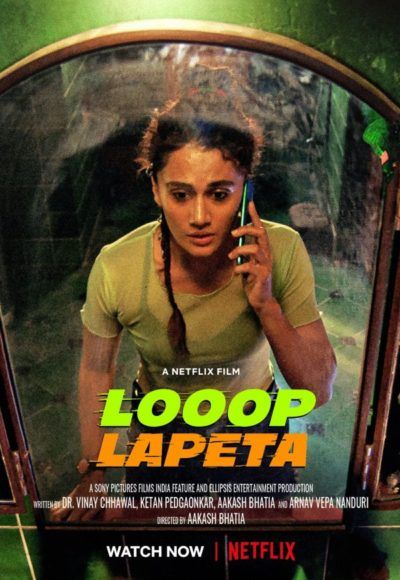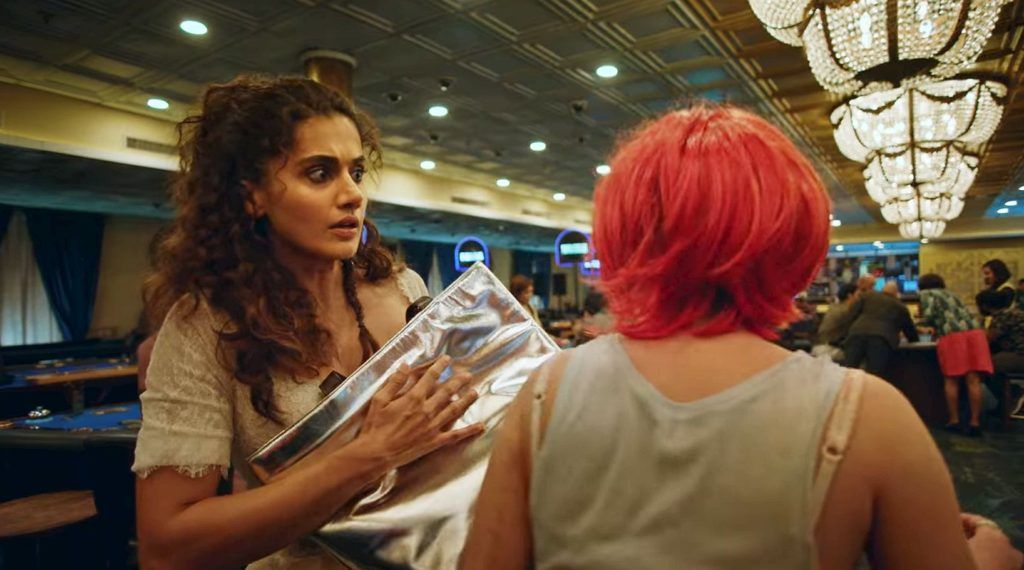
Rating: B
Dir: Aakash Bhatia
Star: Taapsee Pannu, Tahir Raj Bhasin, KC Shankar, Shreya Dhanwanthary
The news that Bollywood had obtained the rights to an official remake of Run Lola Run came as a total surprise to me. The fact that it was available on Netflix, even more so. Give their algorithm a massive fail. I mean, Lola is only one of my all-time favourites. Why would they possibly think I would not be interested in another version? To be fair, I had qualms. The original is such a perfect film, any remake is going to be very hard-pushed to match it, rendering it almost a lost cause. We therefore settled in at Film Blitz Towers for a potential hate watch, feeling someone had tried to clone one of our kids, and was trying to pass it off as the real thing.
As the grade above suggests, however, it was by no means disastrous. It’s different, to be sure, and that’s probably for the best. The makers wisely seem to have realized there was no point in trying to copy Lola shot-for-shot, and have largely gone their own direction. The central framework is there, no question, and also contains some nicely-done nods to the original. But it’s different in many ways – not least in length, where it’s close to an hour more than Lola. That allows for a lot more development of some elements, although not all of these are necessarily particularly welcome. Let’s look in more detail at these similarities and differences.
Firstly, heroine Savina “Savi” Borkar (Pannu) is an actual runner. She’s in hospital after a career-ending injury and contemplating suicide, to the point she’s standing on the edge of the roof. The somewhat shady Satya (Bhasin) has snuck up there for a quick smoke, and talks her down, convincing her life is still worth living. The pair begin a relationship, though Savi is annoyed by Satya’s gambling habit and her father is unimpressed too. In contrast, Lola offers no background on how Manni and Lola got together, and hits the ground running, with him calling Lola in the opening scene to inform her about the loss of 100,000 DM he was couriering for a gangster.
 Here, the problem is similar – it just takes longer to show up – and the amount (five million rupees) converts to about the same sixty thousand dollars, at current exchange rates. Satya intended to take the money and “invest” it at a casino, but ends up getting high on a bus, and fleeing the scene when the cops come aboard. He leaves the money behind, and is unable to recover it, thereby setting in motion subsequent events. As in Lola, Savi takes action, and her first stop is her father, Atul (Shankar). However, there’s a major, rather melodramatic addition to the plot from the beginning, in that Savi has just discovered she’s pregnant.
Here, the problem is similar – it just takes longer to show up – and the amount (five million rupees) converts to about the same sixty thousand dollars, at current exchange rates. Satya intended to take the money and “invest” it at a casino, but ends up getting high on a bus, and fleeing the scene when the cops come aboard. He leaves the money behind, and is unable to recover it, thereby setting in motion subsequent events. As in Lola, Savi takes action, and her first stop is her father, Atul (Shankar). However, there’s a major, rather melodramatic addition to the plot from the beginning, in that Savi has just discovered she’s pregnant.
As in the original, Dad is no help in providing the funds. Instead of being a bank manager, Atul runs a boxing gym, and in a further deviation from Lola, is gay [The film all seems progressive for Indian cinema. There’s also actual kissing here, on the mouth, something I rarely recall seeing previously. Maybe I’ve just been watching the wrong kind of movies], and his relationship with Savi is almost non-existent. On the way to the gym, she interacts with a new character, taxi driver Jacob. His girlfriend Julia (Dhanwanthary) is about to marry another man, though is very conflicted by the matter: the husband-to-be has better prospects, but does she love him?
Meanwhile, Satya has his own plan to raise the needed cash, and this is another significant change. Manni was largely useless compared to Lola, with a poorly-considered plan to rob a supermarket his only solution. Satya is smarter and more pro-active. While his idea is the same, with a jewelery store being the target, he’s rather better prepared for his crime. Or would be, if it weren’t for the fact that the store owner’s two sons, are planning to rob the place themselves, despite having one (1) replica gun between them. Must admit, the matching fluorescent pink ski-masks are fetching, and their interference complicate Satya’s efforts to get the money.
Those are basically the issues which need to be “solved” by Savi in order to succeed. In this aspect, it’s closer to Groundhog Day, where Phil Connors had to address multiple problems in order to escape (the title here basically translates as “Stuck in a loop” – with an extra O for emphasis, I guess). In Lola, getting the money was the only thing that mattered: while other things might take place in her life as a result, they were incidental. It feels as if the karmic implications here tie in to Hindu notions of re-incarnation, and the concept of needing to fix your current life before you are allowed to move on. It’s definitely more spiritual than Lola.
 In both, during the pauses between the three “runs” for Savi, we get to see a flashback to happier times. Here, her boyfriend tells her the legendary story of their namesakes, Savitri and Satyavan, originally found in the Mahabharata. The latter was a prince who was chosen by Savitri as her husband, even as he was prophesied to die a year later. However, she was able to trick the god of death, Yama, into relinquishing his hold on Satyavan’s soul. I imagine the moral of this tale, is that your fate and the future are not fixed, and can be changed if someone is persistent and courageous enough.
In both, during the pauses between the three “runs” for Savi, we get to see a flashback to happier times. Here, her boyfriend tells her the legendary story of their namesakes, Savitri and Satyavan, originally found in the Mahabharata. The latter was a prince who was chosen by Savitri as her husband, even as he was prophesied to die a year later. However, she was able to trick the god of death, Yama, into relinquishing his hold on Satyavan’s soul. I imagine the moral of this tale, is that your fate and the future are not fixed, and can be changed if someone is persistent and courageous enough.
Or, in this case, lucky enough. Both Lola and Savi raise the funds at the casino, albeit in slightly different way. Lola uses her own funds, winning at roulette by betting on #20, then letting her profit ride to a further win. This is more dramatic, with an implication she can bend the universe to her needs, through sheer force of will. In Looop, Savi swipes some cash donations from Julia’s wedding, and one spin (#8) is sufficient. There isn’t the same sense of heroic power, though the screen she lets out on winning, seems like it could be a direct audio sample. Also, on the way out, a flame-haired woman in a vest brushes against Savi and whispers, “Run…” (above) – a lovely homage to the original.
As you probably expect, music plays a significant role in the remake, despite the lack of dance numbers you might be expecting. Sadly we don’t get a Bollywood remake of any of the brilliant techno tunes from the original. However, the title song, by Jay Anant and Sidhant Mago, is a bit of a banger. It’s an accurate summary for the film as a whole. If you compare any individual aspect to Lola, it’s probably going to be found wanting. Yet on its own terms, this is a sprightly and entertaining bit of candy-floss. It’s also the kind of remake which wants to plough its own furrow, helping make it possible to assess the movie independently. And as someone who loves Run Lola Run, I pronounce myself satisfied. That’s all I wanted.
